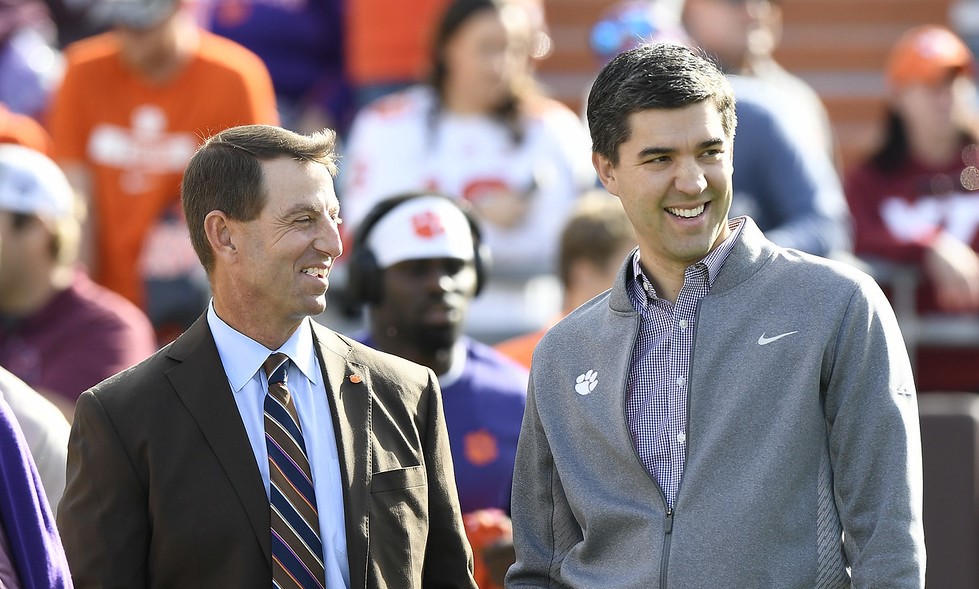CLEMSON — Clemson Athletic Director Graham Neff does not seem too worried about any delays in the House vs NCAA Settlement.
At least that is the way it came across Friday when he spoke with William Qualkinbush on his Out of Bounds show on The Roar 105.5 FM in Upstate South Carolina.
Federal judge Claudia Wilken informed the NCAA this past Wednesday she would not approve the settlement unless some changes are made where new roster limits are concerned. She made it clear, that unless they are, she will deny the settlement.
Wilkins believes immediately implementing roster limits will lead to some college athletes, particularly walk-ons, losing their current roster spots on their teams. Earlier this month, during a hearing, Wilken suggested the NCAA consider delaying its new roster size rules to “grandfather in” current athletes.
The settlement agreement initially required schools to trim their rosters. Football for instance, which has as many as 120 players (85 scholarships + walk-ons) will be forced to trim down to 105 scholarship players on July 1.
“Those class members will be harmed because their roster spot will be or has been taken away as a result of the immediate implementation of the settlement agreement,” Wilken wrote in her order, per an ESPN report. “The Court will delay denial of final approval to permit the parties to attempt to modify the settlement agreement, so that members of the Injunctive Relief Settlement Class will not be harmed by the immediate implementation of the roster limits provisions.”
Neff said there is high confidence the revisions will be taken care of and Wilken is going to adopt the settlement. He is expecting it to happen in the next few weeks or by later next month.
“She asked to go back and look at the roster limit details, which I think is a good thing,” the Clemson Athletic Director said. “She effectively said, come back to me with some edits around that and I will approve it. So, again, it was more tail end to the anticipated adoption.”
Though Clemson should not have a problem adjusting to Wilkins’ request, other schools are not so lucky. Clemson head coach Dabo Swinney has not been a fan of having to cut his walk-on program and has expressed how difficult it was going to be to cut players this summer in order to meet the requirement.
Wilken is giving NCAA attorneys 14 days to implement a grandfather-in concept to roster limits, assuring those athletes who are on a roster do not lose their spot. One large issue is some coaches have already cut players, leading many to enter the transfer portal.
Some coaches have even started pulling offers to high school prospects.
However, Clemson is ready to roll.
“We have working since last summer, call it even the fall, with all of our plans towards what revenue share looks like, what deregulated scholarships look like, what NIL is transitioning to. It is not intend to be booster funded through a collective, but rather commercial NIL through business and companies,” Neff said. “There are all kinds of details there and I happy and here to continue to roll out for Clemson, but we have been fully focused on that and with contingency.
“That is going to start on July 1 and there are still some judicial steps here that have to happen, but we are highly confident that we are right here at the finish line to do that.”
Starting on July 1, schools will be required to share $20.5 million to their student athletes. As previously reported by The Clemson Insider, Clemson plans to devote a large majority of those funds to the football program.
The NCAA and conferences have agreed to amend their rules to permit schools to share $20.5 million in athletic revenues with their athletes for the 2025-’26 academic year, with the cap increasing over the next 10 years due to escalators and scheduled recalculations.
That money will come out of the athletic budget, and each school can decide on its own how it will distribute the revenue. Earlier this week, the NCAA’s Division I Board of Directors voted to eliminate more than 100 current rules from its handbook if the settlement is approved.
–Jason Priester contributed to this story
